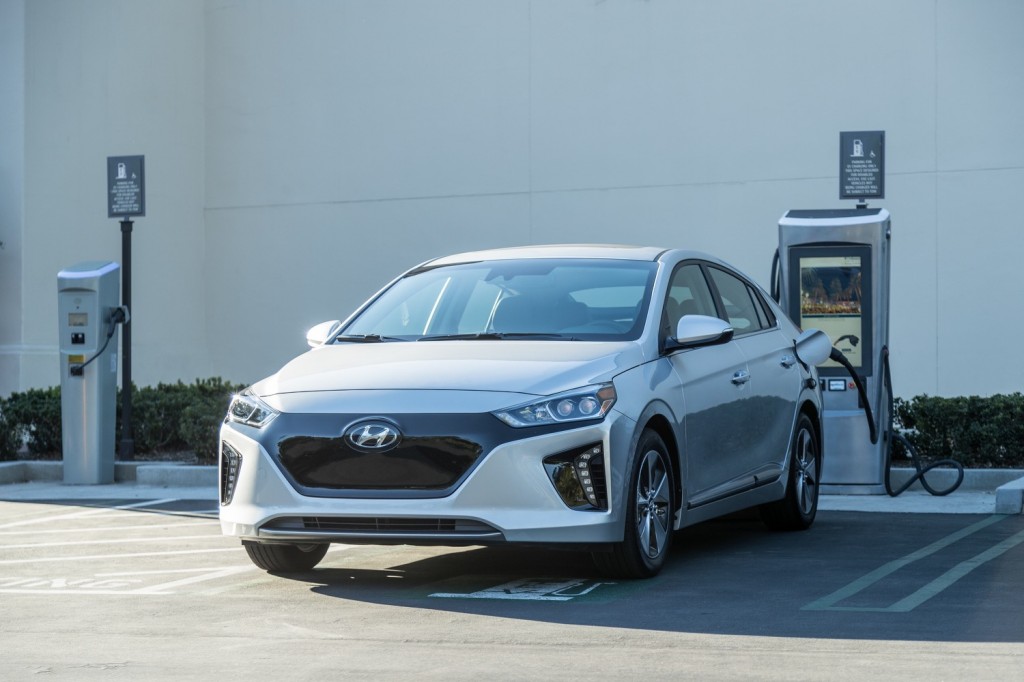Hyundai first made the argument that energy efficiency in electric cars is just as important as their range, as part of its launch of the Ioniq Electric hatchback, EPA-rated at 124 miles.
Now Honda is making that argument as well, based on a news report it confirmed saying that the Clarity EV electric mid-size sedan will have a battery range of about 80 miles.
Statistically, a range of 80 to 100 miles covers the daily needs of most American drivers, especially those with multiple vehicles. (The average U.S. household has 2.4 cars.)
DON'T MISS: Electric-car MPGe as important as range, Hyundai Ioniq maker suggests
But is something like 100 miles of range enough to lure buyers?
Honda, Hyundai, and others are implicitly saying yes when they release new cars with ranges around 100 miles, or even those below the 200-mile benchmark Tesla established as its minimum from the outset.
Writer Bill Howard explores the challenges in a piece published on Extreme Tech last week.

All three versions of Honda Clarity teased (Plug-In Hybrid, Fuel Cell, EV) before 2017 NY auto show
He notes that Honda's Steve Center argues that buyers are "very rational," meaning they feel they neither need nor want to "lug around or charge up a 300-mile-range battery because that costs them electricity.”
No ratings are out yet for the Honda Clarity EV—details will be released at next month's New York auto show—but the 2017 Hyundai Ioniq Electric is the single most energy-efficient vehicle of any kind sold in the U.S. today, rated at 136 MPGe combined.
(Miles Per Gallon Equivalent, or MPGe, is the distance a car can travel electrically on the same amount of energy as contained in 1 gallon of gasoline.)
READ THIS: Honda Clarity EV electric car to have only 80 miles of range: report
Based on feedback from and discussions with literally hundreds of electric-car buyers and shoppers, we think the argument that 100 miles of range suffices may be statistically valid, especially for European and Asian buyers.
But we also think it simply ignores the less rational side of every car purchase. As all good dealership sales staff know, what buyers need and what they want differ significantly. Successful salespeople know there's profit to be made from that difference.
Unlike Europe and Asia, the U.S. has no reliable mass-transit fallback for journeys of 100 miles or more. So we expect far more from our cars than do buyers in other regions.

2017 Hyundai Ioniq Electric
Hyundai says the Ioniq Electric's 124-mile range meets the daily travel needs of fully 98 percent of U.S. drivers.
Subtract from that range miles lost to cold weather, high speeds, and unexpected side trips, and all of a sudden you're approaching the point where buyers may get nervous again if they see only 22 miles of range left at the end of the day.
Electric car owners know that nervousness abates over time as they gain confidence in their cars' ability.
CHECK OUT: Chevy Bolt EV electric range: can 238 miles stretch to 300 miles?
But that confidence only comes after you live with an electric car, and it's extremely hard to explain to anyone who hasn't spent a couple of days driving one in regular daily use.
That conceptual hurdle is steeper when the dealership salesperson in question has no experience at all with cars that plug in.
In the end, as Howard's piece notes, "The truth lies somewhere in the middle"—not everyone will remember to plug in every night, and low range makes drivers very nervous.

Owner Dawn Hall before 800-mile road trip in 2017 Chevrolet Bolt EV electric car
Howard also notes that every battery-electric car sold today is more energy efficient than any gasoline vehicle without a plug, even the 56-mpg Toyota Prius Two Eco, this year's gas-mileage champion.
And that's our rebuttal to the energy-efficiency argument: yes, using less electricity saves you money, but most electric-car drivers already save quite a lot per mile plugging in, no matter which EV they drive.
The next few years, however, will bring electric cars with a much broader array of available ranges. It'll be fascinating to see what the market says appears to be "enough" battery range to make buyers comfortable.
_______________________________________













